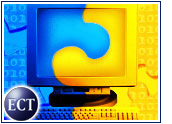
Negotiations have broken down between Texas Instruments and Korean chipmaker-for-hire Dongbu Electronics, dashing Dongbu’s hopes oflanding a US$400 million annual contract with the technology giant.
If Dongbu and Texas Instruments had reached an agreement, the Korean company would have sold $400 million worth of chips to Texas Instruments. In addition, Dongbu would have been able to embrace 0.13 micron technology instead of the 0.18 micron technology it currently uses, increasing sixfold the number of wafers produced each month.
Crimp in Plans
Dongbu’s plans to convince creditors to provide $220 million have been stymied because the company needed to show that it could lure large customers. It was counting on the Texas Instruments deal to show its viability and help it grow into a force to be reckoned with among chipmakers.
A relative newcomer to the chipmaking business — it became a player in 2000 — Dongbu already has built a reputation in other arenas, including chemicals and construction.
Ready To Play
So far, Dongbu has landed a significant customer in Japan’s Toshiba, but the highly competitive and struggling semiconductor market has proven a tough nut to crack. Several entrenched Taiwan-based chipmakers seem to undercut almost every other player. Market leaders include United Microelectronics, Taiwan Semiconductor Manufacturing and Chartered Semiconductor Manufacturing.
Compounding the problem, the market has started to cool. A recent report released by the Semiconductor Industry Association showed that year-to-date chip sales in the Americas have fallen by 10.9 percent compared with figures released in July 2001.
In contrast, global sales actually increased by 5.8 percent, perhaps supporting the notion that U.S. companies are saturated with technology that they are still learning to put to good use.
Analyst Positions
“The cooldown of the US market is true while the global markets have done OK, although we cannot vouch for the 5.8 percent growth unless we are talking about global minus U.S. market,” said Shekar Gopalan, vice president of research and consulting at Frost & Sullivan. “Our assessment is that the global market growth has been offset by the U.S. market slump.”
Gopalan pointed out that several advancements in wireless technologies have not been put to good use in the United States, causing the slump.
“In addition,” Gopalan told the E-Commerce Times, “the overbuild in the late 1990s has caused slowdown in manufacturing across the board — telecom equipment, avionics, professional electronics — all of these use chips and this slowing of manufacturing is another primary reason for the U.S. market slump.”
“Overall we foreast fairly flat growth [in the semiconductor market],” said Shane Rau, an analyst at IDC. According to IDC figures issued in April, the market should grow just 1.3 percent in 2002. The first half of the year was the slowest with a slight uptick expected in the third and fourth quarters as the market responds to seasonal demand.
Market Cooldown
Despite this global growth, companies such as Intel, AMD, National Semiconductor, TSMC and Nvidia all have lowered their sales forecasts for the remainder of this year. And in recent months, IBM has laid off 1,400 people from its semiconductor division.
Since the Texas Instruments arrangement did not work out, Dongbu might give more serious consideration to a possible merger with Anam Semiconductor. Since July, Dongbu has held the largest stake in Anam, which contracts primarily to Texas Instruments and is one of Intel’s CPU suppliers.
The Dongbu deal fell through just a day after Samsung Electro-Mechanics announced an agreement to sell $500 million worth of next-generation circuit boards to Intel. Samsung began manufacturing the new boards in 1998 for Anam, and they now represent one of the company’s most profitable businesses.






















































Social Media
See all Social Media